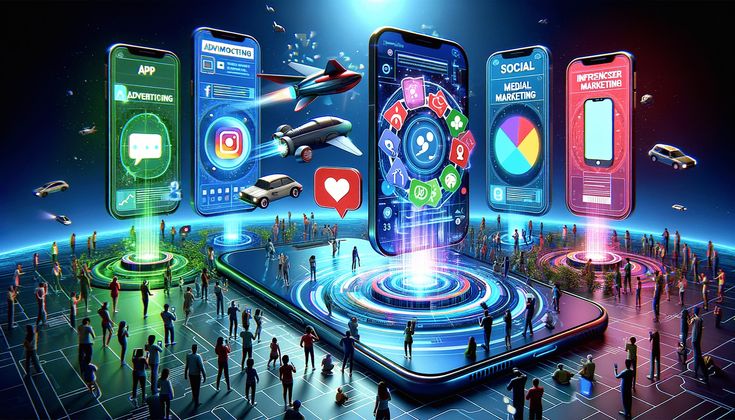As we move into 2025, the mobile app landscape is more competitive than ever. With over 3.8 million apps available in the Google Play Store and 2.2 million in the Apple App Store, standing out requires advanced strategies that blend creativity, data-driven insights, and cutting-edge technology. This guide explores advanced tactics that app marketers need to adopt to thrive in 2025.
1. The Rise of Omnichannel Marketing
Omnichannel marketing remains a cornerstone of app marketing, but 2025 demands a more cohesive approach. Users engage with apps across multiple touchpoints, including social media, email, search ads, and even offline interactions.
Key Strategies:
- Unified Messaging: Ensure consistency across all platforms, tailoring messages to suit each medium while retaining a cohesive brand identity.
- Cross-Platform Retargeting: Use data from one platform (e.g., social media) to retarget users across others (e.g., email or search ads).
- Offline-to-Online Integration: QR codes, NFC technology, and geofencing can link physical experiences to the app, creating seamless user journeys.
2. Leveraging AI for Smarter Marketing
Artificial Intelligence (AI) continues to redefine app marketing. From automating mundane tasks to delivering hyper-personalized experiences, AI tools are a game-changer.
AI Applications:
- Predictive Analytics: Anticipate user behavior, such as churn likelihood or in-app purchase propensity, to make proactive marketing moves.
- Chatbots and Virtual Assistants: Enhance user support and engagement with AI-driven chat features.
- Creative Optimization: Platforms like Canva or AdCreative.ai, powered by AI, can generate highly engaging visuals tailored for your audience.
Case in Point: Netflix uses AI to recommend shows, but its principles apply to apps. By predicting user preferences, apps can offer tailored content or features, boosting retention rates.
3. Enhanced App Store Optimization (ASO)
App Store Optimization (ASO) is evolving into a sophisticated process where engagement metrics like session duration, retention, and reviews play a significant role.
Best Practices for 2025:
- Engagement-Centric ASO: Focus on optimizing not just keywords but also user engagement metrics, as these directly influence app rankings.
- Localized Content: Create app descriptions, titles, and visuals tailored for regional markets, tapping into local cultures and preferences.
- A/B Testing: Regularly test visuals, descriptions, and even app names to determine what resonates best with target audiences.
Pro Tip: Use tools like Sensor Tower and Mobile Action for competitive benchmarking and keyword tracking.
4. Mastering User Acquisition with Advanced Paid Campaigns
Paid advertising continues to dominate user acquisition strategies, but success in 2025 requires an advanced understanding of ad platforms.
Effective Channels:
- Universal App Campaigns (UACs): Google’s AI-powered campaigns optimize ads across Search, Display, YouTube, and the Play Store, delivering high-quality users.
- Social Media Ads: Platforms like TikTok, Instagram, and Snapchat provide unique opportunities for visually-driven app promotions.
- Apple Search Ads (ASA): ASA is increasingly crucial for iOS apps, offering premium placements directly within the App Store.
Budget Allocation Tip: Use lifetime value (LTV) metrics to allocate budgets wisely, focusing on campaigns that drive high-value users.
5. Emphasis on User Retention and Monetization
Acquiring users is only half the battle; retaining them is the key to long-term success. In 2025, apps must focus on improving retention and maximizing revenue from existing users.
Retention Strategies:
- Onboarding Optimization: Create a seamless onboarding experience that highlights the app’s core value within the first few minutes.
- Gamification: Add gamified elements like rewards, challenges, or leaderboards to keep users engaged.
- Regular Updates: Deliver frequent updates with new features and improvements to maintain user interest.
Monetization Tactics:
- Subscription Models: Offer tiered subscription plans to cater to diverse user segments.
- In-App Purchases (IAPs): Focus on non-intrusive and value-driven IAPs, such as exclusive content or virtual goods.
- Upselling & Cross-Selling: Use personalized offers and suggestions to encourage users to upgrade or purchase additional features.
6. Privacy-First Marketing
With regulations like GDPR, CCPA, and Apple’s App Tracking Transparency (ATT), data privacy remains a top concern in 2025. Apps must adopt privacy-first practices to build trust and comply with regulations.
Privacy Practices:
- Transparency: Clearly communicate how data is collected, stored, and used.
- User Consent: Implement robust opt-in mechanisms for data tracking.
- Privacy-Enhancing Technologies: Use tools like Federated Learning of Cohorts (FLoC) for targeted advertising without compromising user privacy.
Fact: According to Statista, 48% of app users avoid apps they perceive as unsafe. Building trust can significantly impact user acquisition and retention.
7. The Role of Emerging Technologies
As technology advances, apps must integrate innovative features to stay relevant.
Trending Technologies:
- Augmented Reality (AR): From virtual try-ons in e-commerce apps to AR-based games, this technology is reshaping user experiences.
- Blockchain: Secure in-app transactions, decentralized apps (dApps), and loyalty programs are gaining traction.
- Voice Search: Optimizing apps for voice commands can enhance accessibility and usability, especially with the rise of smart speakers.
8. Social Proof and Community Building
In 2025, users increasingly rely on social proof before committing to apps. Building a community around your app can amplify trust and loyalty.
Social Proof Strategies:
- User Reviews and Ratings: Encourage satisfied users to leave positive reviews, and address negative feedback promptly.
- Case Studies and Testimonials: Showcase success stories from users or businesses using your app.
- Community Engagement: Build user communities on platforms like Discord, Reddit, or Telegram, fostering a sense of belonging.
Final Thoughts: The Road Ahead
2025 promises exciting opportunities for mobile app marketers, but success will require adaptability, creativity, and a focus on user-centric strategies. By leveraging omnichannel marketing, AI, privacy-first practices, and innovative technologies, apps can thrive in an increasingly competitive landscape.
If you’re ready to take your app marketing to the next level, APS TeQ can help. With a proven track record of driving app growth, we specialize in ASO, paid campaigns, and user retention strategies. Book a free strategy session today and let us help you scale your app in 2025!




